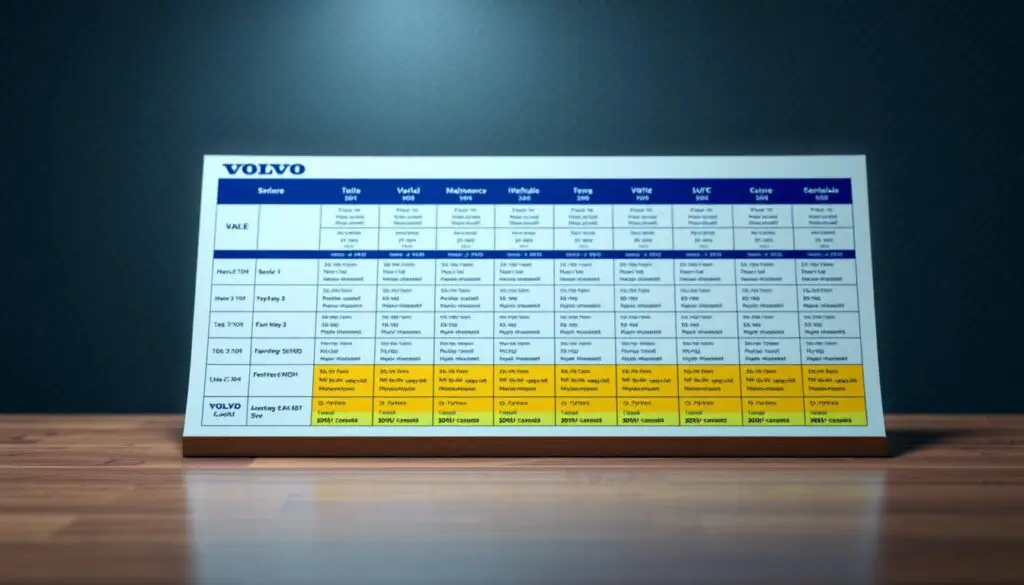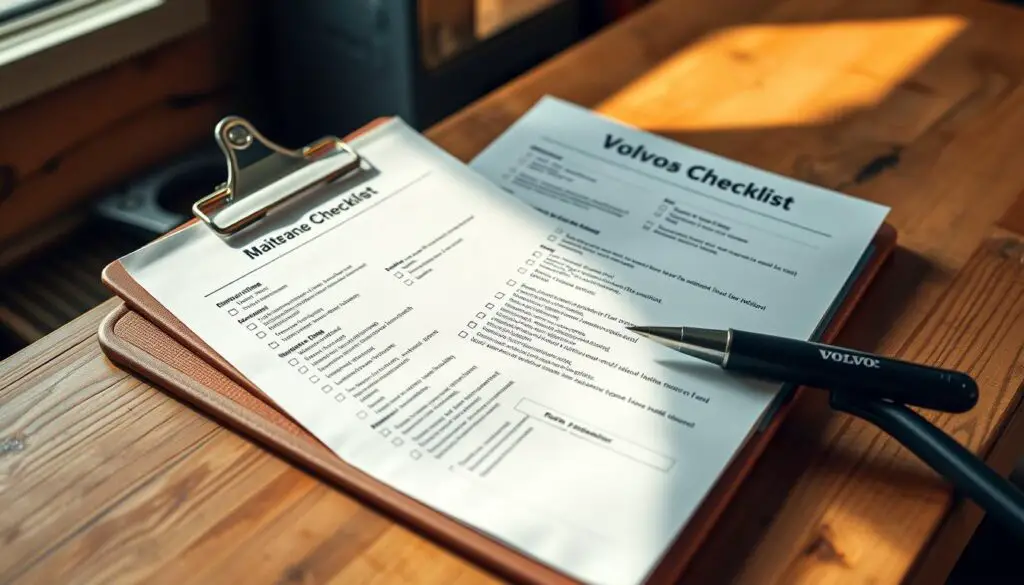Proper care is essential for extending the lifespan of your Volvo vehicle. Following the guidelines outlined in the Volvo owner’s handbook ensures your car remains in optimal condition.
Regular maintenance is crucial for preventing issues and maintaining your vehicle’s performance. By adhering to the recommended schedule, you can identify potential problems early, reducing the need for costly repairs down the line.
Key Takeaways
- Regular maintenance is key to extending your Volvo’s lifespan.
- The Volvo owner’s handbook provides a comprehensive guide to caring for your vehicle.
- Following the recommended maintenance schedule can help prevent costly repairs.
- Proper care enhances your vehicle’s performance and overall condition.
- Adhering to the maintenance manual’s guidelines is essential for optimal vehicle health.
Understanding Your Volvo Maintenance Manual
Familiarizing yourself with your Volvo’s maintenance manual is the first step in taking care of your vehicle and preventing costly repairs. The manual is designed to guide you through the necessary maintenance tasks to keep your Volvo running smoothly.
Decoding Volvo Service Intervals
Volvo’s service intervals are designed to optimize your vehicle’s performance and longevity. The Volvo car service guide outlines the recommended maintenance schedule, including oil changes, tire rotations, and brake pad replacements. Understanding these intervals is crucial to ensuring your Volvo receives the necessary care.
For instance, the service manual will indicate when your Volvo is due for a routine service, which may be based on time (e.g., every 12 months) or mileage (e.g., every 15,000 miles). It’s essential to follow these guidelines to prevent premature wear and tear on your vehicle’s components.
| Service Interval | Mileage | Time |
|---|---|---|
| Oil Change | 15,000 miles | 12 months |
| Tire Rotation | 7,500 miles | 6 months |
| Brake Pad Replacement | 30,000 miles | 24 months |
Locating Critical Maintenance Information
The Volvo maintenance schedule is a critical component of the maintenance manual. It provides a detailed schedule of the maintenance tasks required to keep your Volvo in optimal condition. You can find this information by referring to the manual’s index or by navigating to the dedicated maintenance section.
For more information on the costs associated with maintaining a Volvo, you can visit Are Volvos Expensive to Maintain? to gain a deeper understanding of the financial aspects of Volvo ownership.
“Regular maintenance is key to extending the life of your Volvo and ensuring it runs efficiently. By following the recommended maintenance schedule, you can identify potential issues before they become major problems.”
Essential Volvo Maintenance Procedures
Proper maintenance is crucial for extending the lifespan of your Volvo vehicle. Regular maintenance not only ensures your car runs smoothly but also helps in preventing costly repairs down the line. In this section, we will cover the essential maintenance procedures you need to follow to keep your Volvo in top condition.
Engine Oil and Fluid Maintenance
Engine oil and fluid maintenance are critical components of Volvo maintenance procedures. Regularly checking and changing your engine oil is vital for the longevity of your engine. It’s recommended to check your oil level every time you fill up on gas and change it according to your Volvo’s maintenance plan. Additionally, other fluids such as coolant, brake fluid, and transmission fluid should be inspected regularly to ensure they’re at the recommended levels.
- Check engine oil level regularly
- Change engine oil as per the recommended schedule
- Inspect coolant, brake fluid, and transmission fluid levels
Brake System Care and Inspection
The brake system is another critical area that requires regular inspection as part of your Volvo repair instructions. Worn-out brake pads or damaged rotors can lead to reduced braking performance, posing a significant safety risk. It’s essential to have your brake pads and rotors inspected regularly and replaced when necessary.
- Inspect brake pads for wear
- Check rotors for damage or excessive wear
- Replace brake components as needed
Timing Belt and Critical Component Replacement
Timing belt replacement is a crucial maintenance task that should not be overlooked. A failed timing belt can cause significant engine damage, leading to costly repairs.
Signs Your Timing Belt Needs Replacement
Signs that your timing belt may need replacement include cracks, frays, or uneven wear. If you notice any of these symptoms, it’s crucial to have your timing belt inspected by a professional.
Recommended Replacement Intervals
The recommended replacement interval for your timing belt varies depending on your Volvo’s model and year. Typically, it’s recommended to replace the timing belt between 80,000 to 120,000 miles. Consult your owner’s manual or a certified Volvo mechanic for specific guidance.
Volvo Maintenance Schedule by Model
To keep your Volvo in top condition, it’s essential to follow the recommended maintenance schedule for your specific model. Different models have different requirements based on their design, technology, and intended use.
Volvo’s lineup includes a variety of models, each with its own maintenance needs. Understanding these needs is crucial for ensuring your vehicle runs smoothly and efficiently.
XC90, XC60, and XC40 Maintenance Requirements
The XC90, XC60, and XC40 are popular SUV models from Volvo, known for their safety and performance. For these models, regular maintenance includes oil changes every 7,500 to 10,000 miles, tire rotations, and brake pad inspections.
A key maintenance task for these models is the inspection and potential replacement of the timing belt, typically between 70,000 to 100,000 miles, depending on the model year and engine type.

S60, S90, and V60 Service Guidelines
The S60, S90, and V60 are Volvo’s luxury sedan and wagon offerings, known for their comfort and driving dynamics. Maintenance for these models includes regular oil changes, fluid checks, and inspections of the brake system and suspension.
For the S60, S90, and V60, Volvo recommends checking the condition of the timing belt and other critical components at specific intervals, usually between 50,000 to 100,000 miles.
Hybrid and Electric Volvo Maintenance Considerations
Volvo’s hybrid and electric models, such as the XC90 T8 and XC60 T8, have unique maintenance requirements due to their advanced powertrains. While many maintenance tasks are similar to their gasoline counterparts, there are additional considerations for the electric motor and battery pack.
Regular checks on the high-voltage battery, electric motor, and associated systems are crucial. Additionally, maintenance of the charging system and ensuring proper software updates are important for the longevity and efficiency of these vehicles.
DIY Volvo Maintenance Checklist
For Volvo owners, taking a proactive approach to maintenance can significantly extend the lifespan of their vehicle. A DIY maintenance checklist is an essential tool for ensuring that your Volvo remains in top condition.
Basic Maintenance Tasks for Beginners
Basic maintenance tasks are crucial for keeping your Volvo running smoothly. These tasks are straightforward and can be performed by anyone with basic mechanical knowledge.
Checking and Replacing Fluids
Regularly checking and replacing fluids is vital for the longevity of your Volvo. This includes engine oil, coolant, brake fluid, and transmission fluid. Always refer to your Volvo service manual for the correct fluid types and capacities.
Inspecting Belts and Hoses
Inspecting the condition of belts and hoses is another critical task. Look for signs of wear, cracks, or leaks, and replace them as needed to prevent engine damage.
Advanced DIY Maintenance Procedures
For those with more experience, advanced DIY maintenance procedures can help optimize your Volvo’s performance. This may include tasks such as replacing the timing belt, inspecting the brake system, and updating software.

Essential Tools for Volvo Home Maintenance
Having the right tools is essential for performing DIY maintenance on your Volvo. Some of the basic tools you’ll need include a socket set, wrenches, pliers, and a multimeter. For more advanced tasks, you may need specialized tools such as a timing belt kit or brake pads.
| Tool | Description | Usage |
|---|---|---|
| Socket Set | A comprehensive set of sockets for various bolt sizes | General maintenance and repairs |
| Wrenches | Adjustable and fixed wrenches for tightening and loosening | Brake system, suspension, and other repairs |
| Pliers | Needle-nose and slip-joint pliers for gripping and bending | Electrical and general repairs |
By following this DIY Volvo maintenance checklist, you can ensure that your vehicle remains in excellent condition, enhancing its performance and longevity.
Conclusion: Extending Your Volvo’s Lifespan Through Proper Care
Proper maintenance is crucial for extending the lifespan of your Volvo. By following the guidelines outlined in your Volvo maintenance manual, you can ensure your vehicle remains in optimal condition. Regular maintenance tasks, such as engine oil and fluid checks, brake system inspections, and timing belt replacements, play a significant role in preventing premature wear and tear.
Adhering to the recommended maintenance schedule for your specific Volvo model is vital. Whether you own an XC90, S60, or another model, staying on top of maintenance needs will help prevent costly repairs and maintain your vehicle’s performance. The Volvo maintenance manual provides a comprehensive guide to help you achieve this.
By taking a proactive approach to maintenance, you can enjoy a longer vehicle lifespan, improved safety, and enhanced overall performance. Refer to your Volvo maintenance manual regularly to stay informed and keep your vehicle running smoothly.



